Adding hibiscus to your antioxidant-packed tea blend is a smart choice for boosting your wellness routine. This vibrant flower packs a powerful punch of polyphenols, particularly anthocyanins and flavonoids, which protect against harmful free radicals and oxidative stress. Hibiscus tea offers numerous health benefits, including lowering blood pressure, aiding weight loss, and supporting liver health. Its tart, tangy flavor complements other herbs beautifully, creating a delicious and nutritious drink. With its rich antioxidant content, hibiscus can help reduce inflammation and prevent oxidative damage to heart tissue. Discover how this versatile ingredient can elevate your tea blends and overall health.
Key Takeaways
- Hibiscus contains high levels of polyphenols, particularly anthocyanins and flavonoids, boosting the antioxidant content of tea blends.
- Its tart and tangy flavor profile enhances the overall taste experience of antioxidant-rich tea combinations.
- Hibiscus supports heart health by lowering blood pressure and reducing inflammation in blood vessels.
- It complements other antioxidant-rich herbs like rosehips and elderberry, creating potent wellness-boosting blends.
- Hibiscus aids in weight loss and liver health, adding multifaceted benefits to antioxidant tea blends.
Hibiscus: A Powerful Antioxidant Source
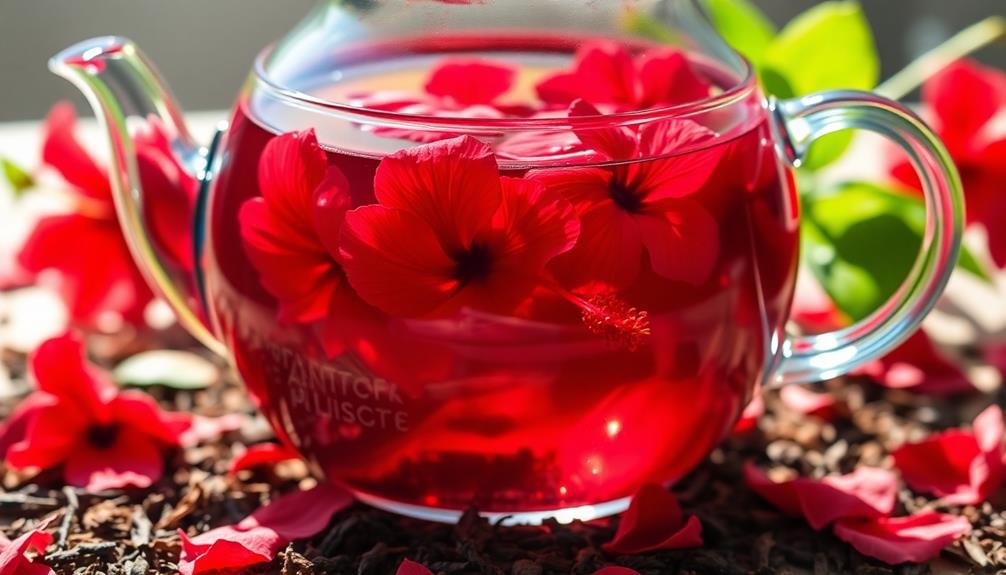
Petals packed with potential, hibiscus is a powerhouse of antioxidants. When you add this vibrant flower to your tea blend, you're harnessing a wealth of health benefits. Hibiscus contains high levels of polyphenols, particularly anthocyanins and flavonoids, which are known for their potent antioxidant properties.
These antioxidants work tirelessly to protect your body from harmful free radicals, which can cause oxidative stress and contribute to various chronic diseases. By incorporating hibiscus into your tea, you're boosting your body's defense against cellular damage and inflammation.
Studies have shown that hibiscus extract can greatly increase antioxidant capacity in the blood. This means you're not just enjoying a delicious, tart flavor; you're also giving your body a natural boost in its fight against oxidative stress.
Moreover, hibiscus antioxidants may help lower blood pressure, reduce cholesterol levels, and support liver health. They've also been linked to potential anti-cancer properties.
Health Benefits of Hibiscus Tea
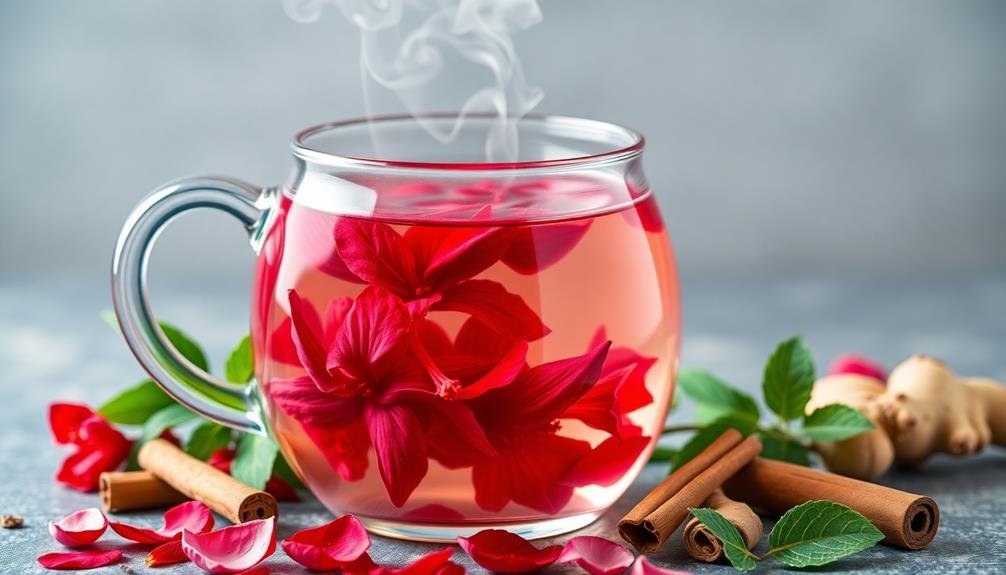
A cup of hibiscus tea offers more than just a vibrant color and tangy taste. It's packed with health benefits that can improve your overall well-being. When you incorporate hibiscus into your tea blend, you're adding a powerful ally to your daily routine.
Hibiscus tea can help lower blood pressure, reducing the risk of heart disease and stroke. It's also known to support weight loss efforts by inhibiting the production of amylase, an enzyme that breaks down complex sugars and starches. Additionally, hibiscus tea may boost your immune system and help fight off infections.
Here's a quick overview of some key health benefits:
| Benefit | How It Helps |
|---|---|
| Heart Health | Lowers blood pressure and cholesterol |
| Weight Management | Reduces fat absorption and boosts metabolism |
| Liver Function | Supports detoxification processes |
| Digestive Health | Aids in relieving constipation and bloating |
Flavor Profile of Hibiscus
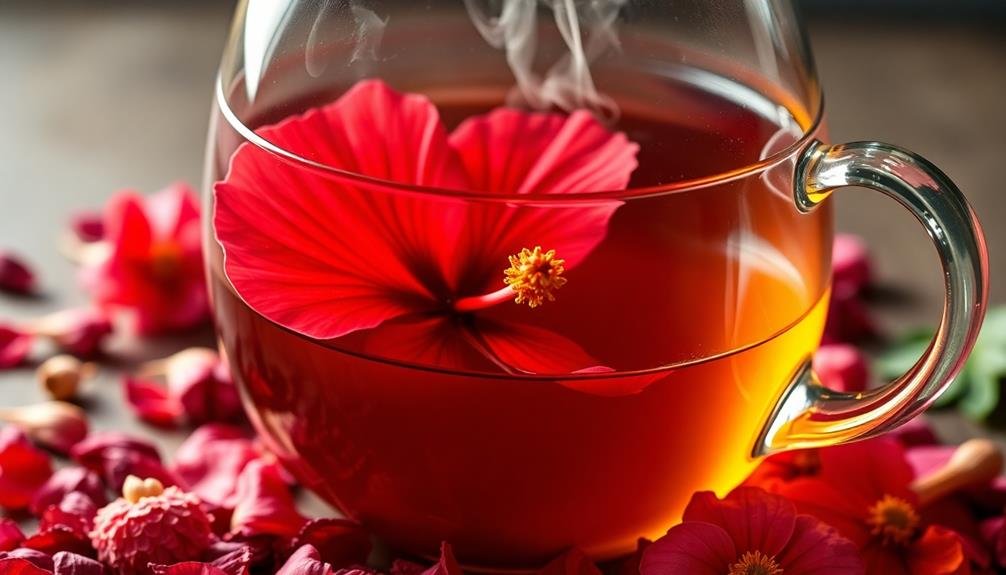
While hibiscus offers numerous health benefits, its distinctive flavor profile is what truly sets it apart in tea blends. You'll immediately notice its tart and tangy taste, reminiscent of cranberries or pomegranates. This bold flavor is complemented by a subtle sweetness that lingers on your palate.
The intensity of hibiscus can vary depending on the brewing method and strength. When steeped for a shorter time, you'll experience a lighter, more invigorating taste. A longer steep will result in a deeper, more robust flavor with increased astringency.
Hibiscus tea's vibrant red color adds visual appeal to your cup, making it an attractive addition to any blend. Its versatility allows it to pair well with other ingredients, enhancing the overall taste profile of your tea. You can combine it with fruity flavors like berry or citrus for a revitalizing summer drink, or mix it with warming spices like cinnamon and ginger for a comforting winter brew.
The unique flavor of hibiscus also makes it an excellent base for iced teas and cocktails. Its natural tartness can balance out sweeter ingredients, creating a well-rounded and satisfying beverage.
Hibiscus and Heart Health
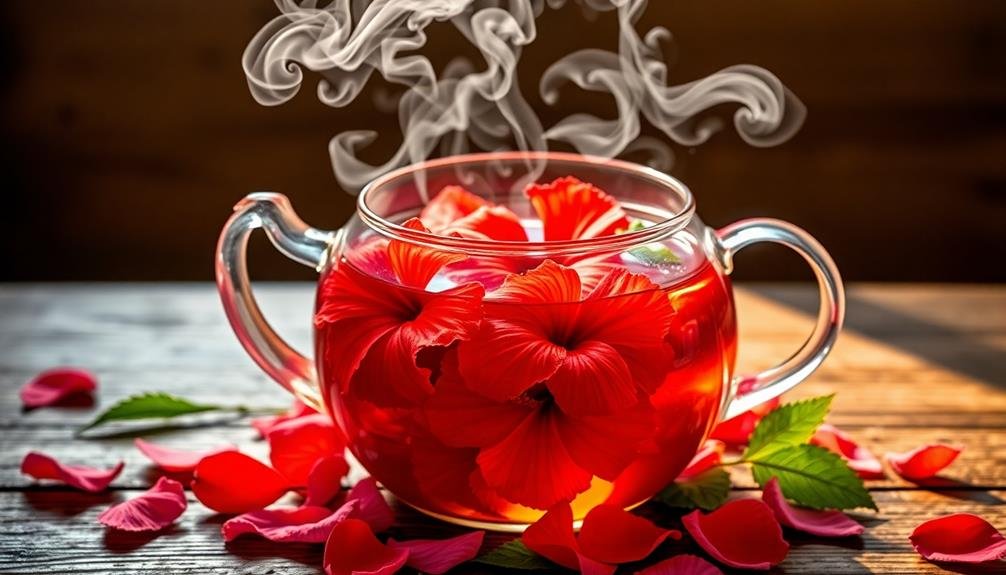
Research suggests that hibiscus tea may offer significant benefits for heart health. Regular consumption of this vibrant, tart beverage has been linked to improvements in several cardiovascular risk factors.
Studies have shown that drinking hibiscus tea can help lower blood pressure, reduce harmful cholesterol levels, and improve overall heart function.
The heart-healthy properties of hibiscus are attributed to its high antioxidant content, particularly anthocyanins and polyphenols.
These compounds work to:
- Reduce inflammation in blood vessels
- Prevent oxidative damage to heart tissue
- Improve blood flow and circulation
- Lower the risk of blood clot formation
- Support healthy endothelial function
Complementary Herbs for Hibiscus Blends
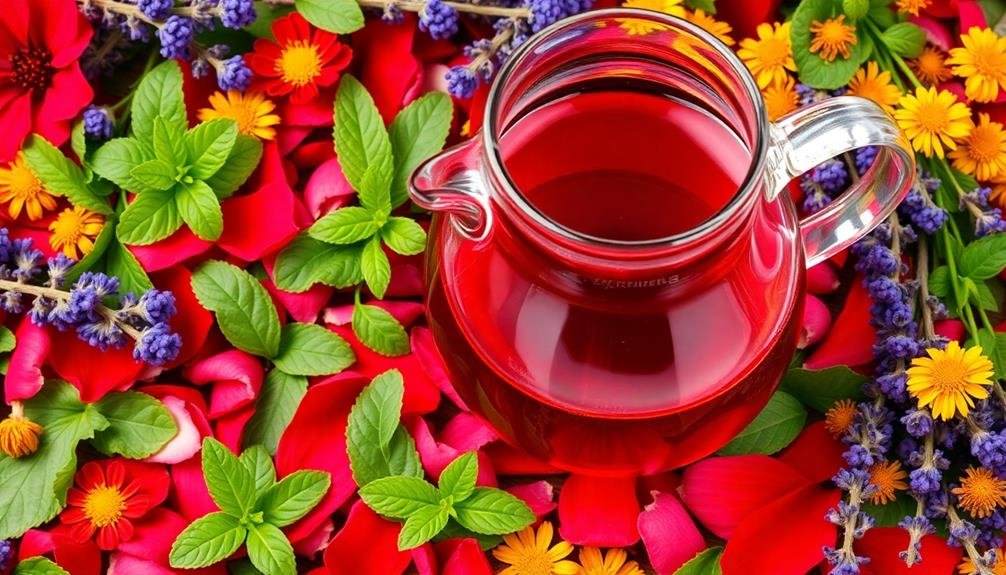
You'll find that hibiscus tea pairs wonderfully with a variety of herbs to create flavorful and healthful blends.
Mint, lemongrass, and ginger can enhance the tangy profile of hibiscus while adding their own unique benefits.
Flavor-Enhancing Herbal Companions
Hibiscus tea's bold, tart flavor profile serves as an excellent canvas for creating complex and harmonious blends. By pairing hibiscus with complementary herbs, you can enhance its taste and create unique flavor combinations.
When selecting herbal companions for your hibiscus blend, consider ingredients that balance its tartness or accentuate its floral notes.
Some flavor-enhancing herbal companions for hibiscus include:
- Lemongrass: Adds a citrusy, slightly sweet note
- Mint: Provides a cooling, revitalizing element
- Rosehips: Enhances the tart flavor and boosts vitamin C content
- Cinnamon: Offers warmth and subtle spiciness
- Ginger: Contributes a zesty, spicy kick
These herbs not only complement hibiscus's flavor but also bring their own health benefits to the blend.
You'll find that combining hibiscus with lemongrass creates a bright, tangy infusion, while adding mint results in a more invigorating drink. For a warming blend, try hibiscus with cinnamon and ginger.
Experiment with different ratios to find your perfect balance. Remember, the key is to enhance, not overpower, the hibiscus flavor. Start with small amounts of complementary herbs and adjust to taste.
Wellness-Boosting Tea Combinations
Beyond enhancing flavor, combining hibiscus with other herbs can create powerful wellness-boosting blends. You'll find that pairing hibiscus with specific herbs can target various health concerns and amplify the overall benefits of your tea. For example, blending hibiscus with ginger can support digestive health and reduce inflammation, while adding lemon balm may help alleviate stress and promote relaxation.
Consider these popular hibiscus combinations and their potential wellness benefits:
| Herb | Benefits | Flavor Profile |
|---|---|---|
| Rosehip | Vitamin C boost, immune support | Tart, fruity |
| Elderberry | Antioxidant-rich, immune support | Sweet, berry-like |
| Mint | Digestive aid, revitalizing | Cool, invigorating |
| Chamomile | Calming, sleep-promoting | Floral, soothing |
When creating your wellness-focused hibiscus blend, experiment with different ratios to find the perfect balance of flavors and benefits. You can also add a touch of honey or stevia for sweetness if desired. Remember that while these blends can support your overall well-being, they're not substitutes for medical advice or treatment. Enjoy your custom hibiscus tea combinations as part of a healthy lifestyle and consult with a healthcare professional for specific health concerns.
Brewing Perfect Hibiscus Tea
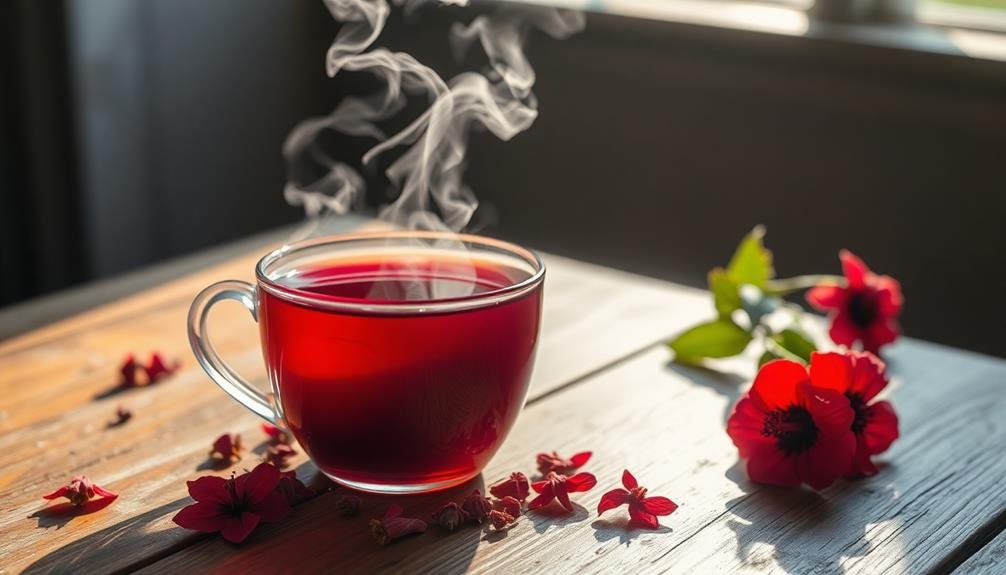
Brewing the perfect cup of hibiscus tea is an art that requires attention to detail. To achieve the best flavor and maximize its health benefits, you'll want to follow a few key steps.
Start by using fresh, high-quality hibiscus flowers or tea bags. For loose flowers, use about 2 teaspoons per cup of water. Bring your water to a boil, then remove it from heat and let it cool for 30 seconds before pouring over the hibiscus. Steep for 5-7 minutes, depending on your desired strength.
For an exceptional hibiscus tea experience, consider these tips:
- Use filtered water for a cleaner taste
- Add a slice of fresh ginger for extra zing
- Experiment with honey or agave as natural sweeteners
- Try it iced for a revitalizing summer drink
- Blend with other herbal teas like mint or lemongrass
Hibiscus in Traditional Medicine
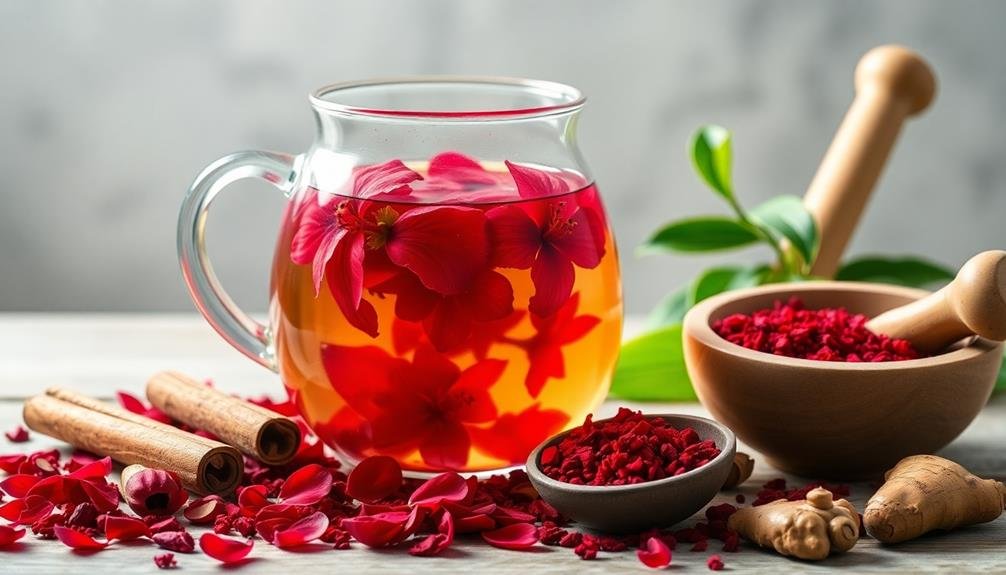
Steeped in centuries of traditional medicine, hibiscus has long been revered for its healing properties. You'll find this vibrant flower used in various cultures worldwide to address a range of ailments.
In Egypt, it's traditionally consumed as a revitalizing beverage to cool the body and support heart health. Many African countries have incorporated hibiscus into their medicinal practices, using it to manage high blood pressure and reduce fever.
In traditional Chinese medicine, hibiscus is believed to promote blood circulation and aid digestion. You might also encounter it in Ayurvedic practices, where it's used to support liver function and alleviate menstrual discomfort.
In the Caribbean, hibiscus tea is often consumed to help with colds and flu symptoms.
Modern research has begun to validate many of these traditional uses. Studies suggest that hibiscus may indeed help lower blood pressure, reduce cholesterol levels, and provide antioxidant benefits.
While it's not a substitute for medical treatment, incorporating hibiscus into your tea blend can be a flavorful way to tap into these potential health benefits rooted in centuries of traditional wisdom.
Sourcing Quality Hibiscus Flowers
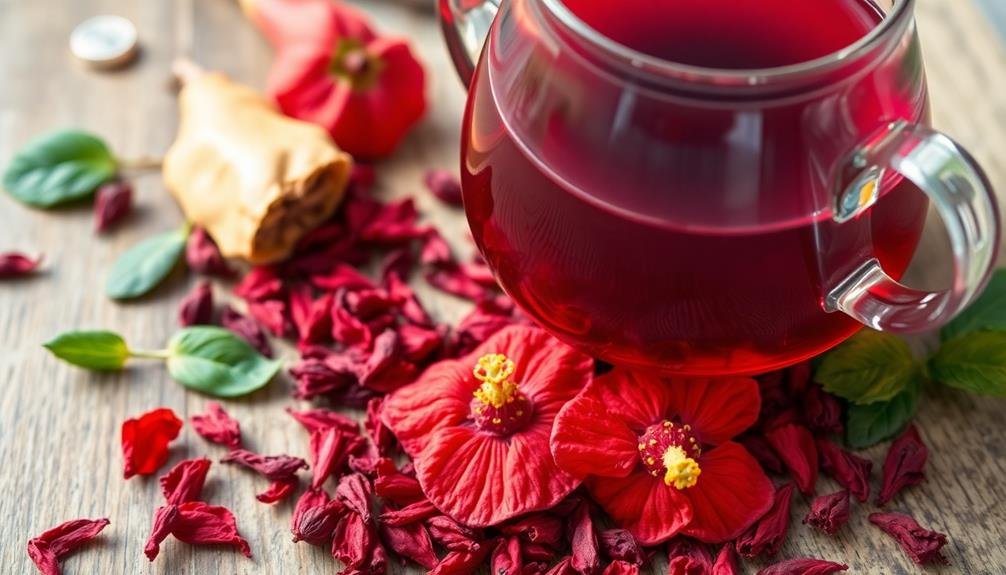
When it comes to creating exceptional hibiscus tea blends, the quality of your flowers is paramount. To guarantee you're using the best hibiscus possible, consider sourcing from reputable suppliers who specialize in organic, sustainably harvested flowers.
Look for vibrant, deep red petals that are free from discoloration or damage. Pay attention to the origin of your hibiscus flowers, as different regions can produce varying flavor profiles. Egyptian and Sudanese hibiscus are particularly prized for their bold, tart taste.
When selecting your flowers, keep these factors in mind:
- Petal color: Seek deep, rich reds
- Aroma: Fresh, floral scent without mustiness
- Texture: Dry and crisp, not damp or sticky
- Size: Uniform, whole petals rather than crushed fragments
- Certification: Organic and fair-trade labels for ethical sourcing
You'll want to store your hibiscus flowers in an airtight container away from light and moisture to preserve their quality.
Hot vs. Iced Hibiscus Tea
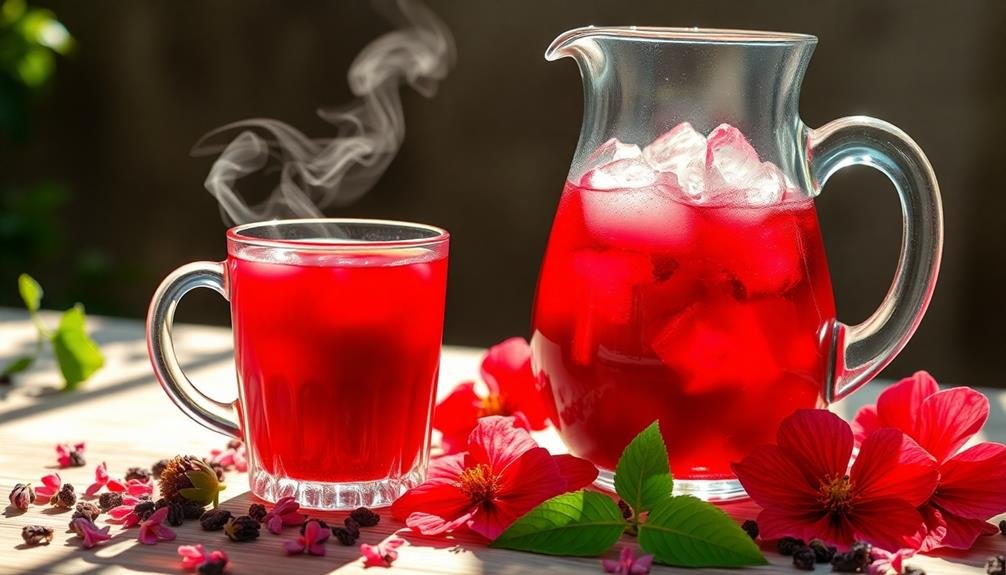
Throughout the year, hibiscus tea offers versatility in its preparation, shining as both a comforting hot beverage and a rejuvenating iced drink. When served hot, hibiscus tea provides a warming, soothing experience. Its tart flavor profile is more pronounced, and you'll notice subtle floral notes that might be less apparent in cold preparations.
Hot hibiscus tea is perfect for chilly days or when you're looking to unwind.
On the other hand, iced hibiscus tea is an invigorating option for warmer weather or post-workout hydration. The cooler temperature mellows the tartness slightly, creating a more balanced and thirst-quenching drink. You can easily make a large batch and store it in the refrigerator for quick access.
Both hot and iced preparations retain hibiscus tea's health benefits, including its high vitamin C content and potential to lower blood pressure. However, if you're sensitive to acidity, you might find the hot version more palatable, as heat can soften the tea's natural tartness.
Ultimately, your choice between hot and iced hibiscus tea will depend on personal preference, the occasion, and the weather.
Potential Side Effects

While hibiscus tea offers numerous health benefits, it's important to be aware of its potential side effects. You should exercise caution when consuming hibiscus, especially if you have certain health conditions or are taking medications.
Some potential side effects of hibiscus tea include:
- Lowered blood pressure: If you're already on blood pressure medication, hibiscus may cause it to drop too low.
- Increased risk of bleeding: Hibiscus can act as a blood thinner, potentially increasing bleeding risk.
- Liver toxicity: In rare cases, excessive consumption may lead to liver damage.
- Pregnancy complications: Pregnant women should avoid hibiscus due to its effects on hormones.
- Interactions with medications: Hibiscus can interfere with certain drugs, including diabetes and malaria medications.
If you're considering adding hibiscus to your tea blend, it's wise to consult your healthcare provider first. They can advise you on whether it's safe for you to consume and in what quantities.
Incorporating Hibiscus Into Daily Routine
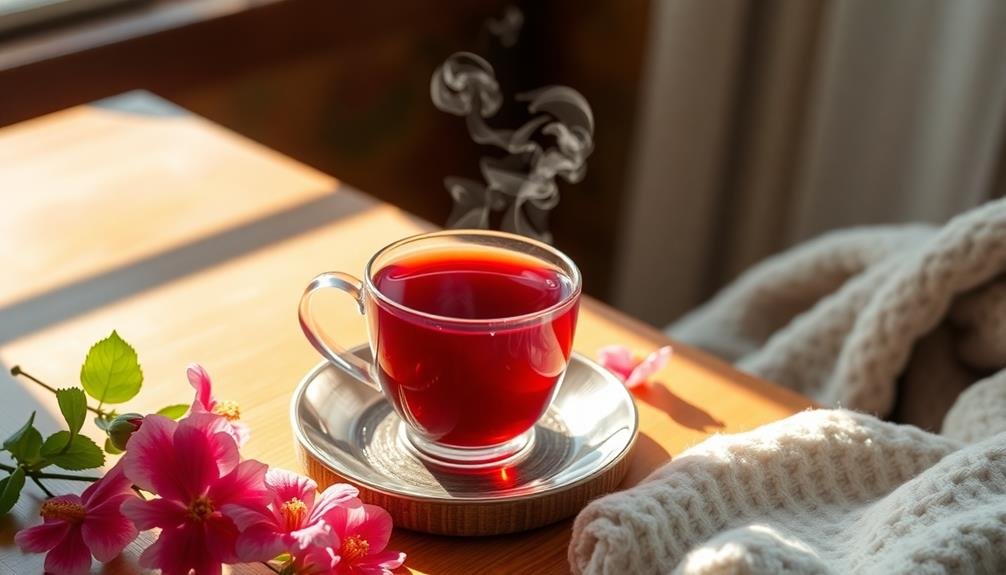
You'll find hibiscus tea easy to incorporate into your daily routine with simple brewing methods.
Whether you prefer hot or iced, you can steep dried hibiscus flowers in water for a quick, invigorating beverage.
Beyond drinks, you can explore creative culinary applications, using hibiscus in sauces, marinades, or even as a colorful garnish for desserts.
Easy Brewing Methods
Incorporating hibiscus into your daily tea routine is surprisingly simple. You'll find that brewing hibiscus tea is a quick and easy process that can be done in various ways.
Whether you prefer hot or cold tea, there's a method that'll suit your taste and schedule.
For hot hibiscus tea, you can use these easy brewing methods:
- Steeping dried hibiscus flowers in boiling water for 5-10 minutes
- Using hibiscus tea bags for a convenient single-serve option
- Adding hibiscus to your favorite tea blend for a floral twist
- Brewing hibiscus with other herbs like mint or ginger for added flavor
- Using a French press to steep and strain loose hibiscus petals
If you're in the mood for a revitalizing cold drink, try making hibiscus iced tea.
Simply brew a stronger concentration of hot hibiscus tea, let it cool, and pour over ice. You can also make a cold brew by steeping hibiscus in room temperature water for 12-24 hours in the refrigerator.
This method results in a smoother, less acidic flavor that's perfect for summer days.
Creative Culinary Applications
Beyond brewing tea, hibiscus offers a world of creative culinary possibilities. You can easily incorporate this versatile flower into your daily routine, adding both flavor and health benefits to various dishes. Try infusing hibiscus into syrups, jams, or sauces for a tangy kick. It's also an excellent addition to salad dressings, marinades, and even baked goods.
For a rejuvenating twist, use hibiscus to create vibrant ice cubes or popsicles. These not only look stunning but also impart a subtle floral taste to your beverages. Don't forget about cocktails and mocktails – hibiscus can elevate your drink game with its unique flavor profile and striking color.
Here's a quick guide to incorporating hibiscus into different meal types:
| Meal Type | Hibiscus Application | Example |
|---|---|---|
| Breakfast | Jam or Syrup | Hibiscus Pancake Topping |
| Lunch | Salad Dressing | Hibiscus Vinaigrette |
| Dinner | Sauce or Glaze | Hibiscus-Glazed Salmon |
Frequently Asked Questions
Can Hibiscus Tea Stain Teeth or Clothing?
Yes, hibiscus tea can stain both teeth and clothing. Its vibrant red color contains pigments that may leave marks. You'll want to rinse your mouth after drinking and be careful not to spill it on your clothes.
Is Hibiscus Tea Safe for Pregnant or Breastfeeding Women?
If you're pregnant or breastfeeding, it's best to avoid hibiscus tea. It may affect hormone levels and potentially cause complications. Always consult your healthcare provider before consuming any herbal teas during pregnancy or while nursing.
How Long Can Brewed Hibiscus Tea Be Stored in the Refrigerator?
You can store brewed hibiscus tea in the refrigerator for up to 3-4 days. It's best to keep it in an airtight container to maintain freshness. Don't forget to discard it if you notice any off-smells or changes in appearance.
Does Hibiscus Tea Contain Caffeine?
You'll be pleased to know that hibiscus tea is naturally caffeine-free. It's made from the hibiscus flower, not tea leaves, so you can enjoy it any time without worrying about caffeine affecting your sleep or energy levels.
Can Hibiscus Tea Interact With Certain Medications or Medical Conditions?
Yes, hibiscus tea can interact with certain medications and conditions. It may affect blood pressure and interfere with some drugs. If you're on medication or have health concerns, it's best to consult your doctor before consuming hibiscus regularly.
In Summary
You've discovered the power of hibiscus in your tea blend. It's not just about the vibrant color and tart flavor; you're boosting your antioxidant intake and potentially improving heart health. Whether you prefer it hot or iced, hibiscus can easily become part of your daily routine. Remember to source quality flowers and be aware of potential side effects. By adding hibiscus to your tea, you're sipping your way to better health with every cup.




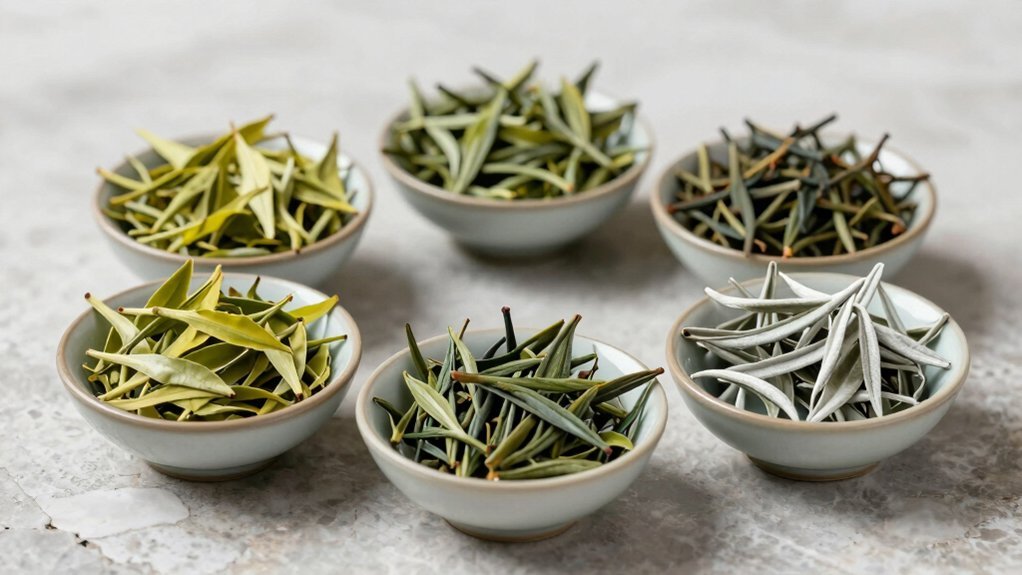
Leave a Reply